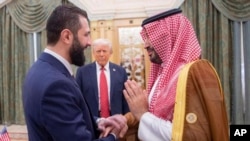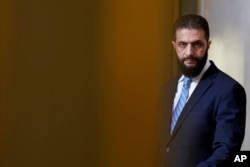Welcome back to The Farda Briefing, an RFE/RL newsletter that tracks the key issues in Iran and explains why they matter.
I'm RFE/RL correspondent Kian Sharifi. In this edition, I'm looking at how hardline Iranian media have reacted to President Donald Trump's historic meeting with Syrian leader Ahmed al-Sharaa in Saudi Arabia.
What You Need To Know
• Mixed Reactions In Iran To Trump's Meeting With Sharaa: US President Donald Trump's historic meeting with Syrian President Ahmed al-Sharaa in the Saudi capital, Riyadh, has not gone over well with hard-line media in Iran. Moderate outlets largely stuck to straight reporting of the meeting, but conservative media upset over Syria's exit from Iran's orbit criticized Trump for meeting with the insurgent-turned-president.
• Tehran, European Powers Look To Reset Relations: Iran and the E3 -- Britain, France, and Germany -- are set to meet in Istanbul on May 16 to reset relations. The three European powers have been sidelined in nuclear talks between Tehran and Washington. Diplomats say discussions will focus on sanctions relief and Iran's nuclear commitments. The meeting will be held at the level of deputy foreign ministers or political directors.
• Trump Reportedly Drops Plan To Rename Persian Gulf: Trump has decided not to rename the Persian Gulf, backing away from earlier plans to call it the "Arabian Gulf", according to CNN and NBC. The reversal follows strong warnings from Iran and concerns about escalating tensions amid ongoing nuclear talks. Trump's initial suggestion to change the name sparked outrage among Iranians and united political factions in opposition.
The Big Issue
'Meeting The Godfather'
Trump met Sharaa -- a former insurgent known under the nom de guerre Abu Mohammed al-Jolani -- on the sidelines of a gathering with the leaders of the Gulf Cooperation Council in Riyadh on May 14, a day after pledging to lift sanctions on Syria.
The US president said he had made the decision in a bid to provide Syria with "an opportunity for greatness" as the country looks to rebuild after 14 years of civil war and economic devastation.
Hard-line newspaper Keyhan, whose chief editor is appointed by Supreme Leader Ayatollah Ali Khamenei, derided Trump's talk with Sharaa and described it as a meeting between "Jolani the terrorist" and "the terrorist godfather."
The Islamic republic has long alleged that the United States funds extremist groups in the Middle East to destabilize the region and has dismissed Washington's campaign in the region against those groups as a farce.
Tasnim, an affiliate of the US-blacklisted Islamic Revolutionary Guards Corps (IRGC), echoed that sentiment, describing the Trump-Sharaa meeting as the United States "formalizing its relationship with Takfiri groups" -- a term used by the Islamic republic to refer to militants groups that it claims have ties to regional Sunni states.
Other hard-line media noted that Hayat Tahrir al-Sham, a group Sharaa led before toppling the government of Iran- and Russia-backed Bashar al-Assad in December, was still designated as a terrorist organization by the United States.
Shirin Jaafari, a reporter for The World who just wrapped up a visit to Syria, told RFE/RL's Radio Farda that people she spoke to during her trip were happy but also worried about the future.
"There are some concerns because they don't know what sort of future the new government has envisioned for them," she said.
Jaafari added, however, that Trump's announcement caused major celebrations across Iran, "instilling people with hope that this will be a turning point for their country."
Why It Matters: The fall of Assad dealt a major blow to Iran, which relied heavily on Syria to link its "axis of resistance," its network of regional allies and proxies.
Sharaa has been welcomed by most Arab nations in the region and has received dozens of international delegations, including European diplomats. Earlier this month, he traveled to France to meet President Emmanuel Macron.
Trump, who described Sharaa as "a young attractive guy" with a "strong past," urged the Syrian leader to normalize relations with Israel as one of five conditions to reset ties with Washingtons.
Iran's influence in Syria effectively vanished with the fall of Assad, but Russia has tried to establish relations with the new government and maintain its bases in the country.
"Russia exploited the fact that Syria remained sanctioned and that the United States and Europe were dragging their feet on sanctions removal," Nicole Grajewski, a fellow at the Carnegie Endowment for International Peace, told RFE/RL.
She noted that while the decision to lift sanctions is "significant," it is "not transformative" as Syria still needs investment and there are outstanding issues between minorities and the government as well as the status of the Kurds.
Iran, however, is pretty much out of the picture for now.
"They lack the economic capital to help with reconstruction and are viewed [by Syrians] much more negatively than Russia," she added.
What's Being Said: Referring to reports that Trump's announcement on lifting sanctions on Syria surprised the State and Treasury departments, UK-based political commentator Hossein Derakhshan argued that Iran really only needs to reach a deal with the US president to remove sanctions.
"Iran needs to understand that this opportunity will not repeat itself and the lifting of primary and secondary sanctions is worth suspending uranium enrichment for 25 years, or even more!" he wrote on X.
Trump said during his tour of the region this week that the United States is "getting close to maybe doing a deal" with Iran on its nuclear program. "We're in very serious negotiations with Iran for long-term peace," he said.
Meanwhile, Ali Shamkhani, a senior aide to Khamenei, told NBC News that Iran would commit to never making a nuclear weapon, ship out highly enriched uranium, and agree to enrich uranium to levels needed for civilian use if Trump agreed to immediately remove sanctions against Tehran.
Expert Opinion: Jihadi media specialist Mina al-Lami said jihadist and hard-line Islamists inside and outside of Syria worry that Sharaa will "sell out" foreign fighters and normalize ties with Israel, and even crack down on Islamic projects in Syria.
"Nevertheless, hardliners are struggling to rally broader support, as the lifting of sanctions is widely seen as a major win for Sharaa, and a clear boost to his image and credibility as a political leader," she wrote on X.
That's all from me for now.
Until next time,
Kian Sharifi
If you enjoyed this briefing and don't want to miss the next edition, subscribe here. It will be sent to your inbox every Friday.







